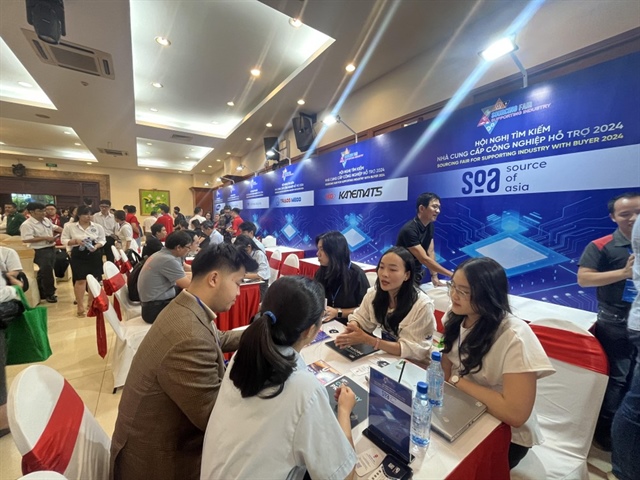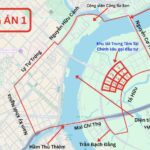The Ho Chi Minh City People’s Committee has issued Decision 42/2024/QD-UBND on the implementation of interest rate support policies for investment projects financed by the Ho Chi Minh City Finance and Investment State-owned Company (HFIC) in priority areas for socio-economic development in the city. This decision is based on Resolution 98 of the National Assembly and Resolution 09/2023 of the Ho Chi Minh City People’s Council (HĐND).
According to the decision, businesses can borrow up to VND 200 billion per project, with an interest rate support of up to 100% and a support period of up to seven years. Decision 42 took effect from the end of July.
Interest rate support of up to 100% helps businesses overcome financial difficulties
Mr. Do Phuoc Tong, Chairman of the Ho Chi Minh City Mechanical and Electrical Association, evaluated that with Decision 42, some businesses will be bolder in investing in new equipment and technology to improve their competitiveness and meet the increasing demands of foreign-invested companies or foreign customers. This will help businesses participate deeper in the global supply chain and produce products that can substitute for imported goods.
“Therefore, this policy is very significant for the development of businesses and the growth of the city’s mechanical industry,” Mr. Tong emphasized.
As one of the 98 green-titled businesses in Ho Chi Minh City in 2024, Mr. Vuong Ngoc Dung, Marketing Director of Saigon Cosmetics Joint Stock Company (SCC), said that the city’s investment stimulus program with interest rate support is very meaningful for businesses.
According to Mr. Dung, to meet the demands of the world and domestic markets in consuming green products, SCC has been implementing projects to go green. As this is a long-term process, the company will study, balance capital needs, and consider the conditions to participate in the program.
“The maximum loan amount and the interest rate support level of the program are very practical, especially for small and medium-sized enterprises. However, using capital efficiently requires businesses to have a long-term strategy. Therefore, for green and digital transformation projects, companies that meet the conditions will benefit greatly,” said Mr. Dung.
Some other businesses have expressed their enthusiasm for this program and hope to access loans easily and quickly.
Dr. Tran Quang Thang, Director of the Ho Chi Minh City Institute of Economics and Management (a delegate of the Ho Chi Minh City People’s Council), said that Decision 42 brings many important meanings for businesses and the development of Ho Chi Minh City.
Specifically, the interest rate support policy helps businesses reduce borrowing costs, thereby focusing resources on product and service development. It motivates businesses to invest in priority areas such as high technology, digital transformation, healthcare, education, and economic infrastructure. It also facilitates startups and innovative businesses to access capital more easily and develop breakthrough business ideas.
In terms of Ho Chi Minh City’s development, providing interest rate support for projects in priority areas will promote the city’s socio-economic development, create more jobs, and improve the quality of life for its citizens.
|
This policy not only supports businesses in overcoming financial difficulties but also makes an important contribution to the sustainable and comprehensive development of Ho Chi Minh City. Dr. Tran Quang Thang |
Especially, encouraging investment in high-tech and digital transformation fields helps build a modern and sustainable economy for the city. On the other hand, supporting domestic businesses will enhance Ho Chi Minh City’s competitiveness in the international market and attract more foreign investors.
 |
Capital source of more than VND 100,000 billion awaits lending
Mr. Nguyen Ngoc Hoa, Chairman of HFIC, said that according to Decision 42, they are currently waiting for the establishment of an inter-sector working group led by the Department of Planning and Investment in fields such as high technology, startups and innovation, healthcare, education, and social housing…
The inter-sector working group, with the Department of Industry and Trade as the focal point, is related to four key industries and supporting industries. This group is in charge of receiving registration dossiers from businesses and advising the Ho Chi Minh City People’s Committee to approve or disapprove projects for interest rate support according to regulations.
“HFIC, with its role, has coordinated with the Department of Health and hospitals to implement this interest rate support policy and answer inquiries related to it so that businesses can access and participate in the program. Projects in the fields of healthcare, education, and environment have been pre-appraised by HFIC to be ready for implementation as soon as the working group is established,” said Mr. Hoa.
At the same time, instead of waiting for businesses to contact HFIC for loan applications, the company has proactively organized working sessions to communicate this policy since the issuance of Resolution 98. Notably, in February, HFIC and the Ho Chi Minh City Business Association (HUBA) signed a cooperation agreement to support businesses in accessing and participating in this program.
Mr. Nguyen Quang Thanh, Vice Director of HFIC, said that this program has some new features, such as a clear and detailed loan procedure with specific forms.
For public non-business units, depending on specific cases, loans can be made without counterpart funds, multiple projects can be borrowed at the same time, and multiple sources of capital can be combined in the financial structure of the project. Assets formed after the loan can be used as collateral for the loan.
In addition, to ensure capital sources for the program, besides existing capital, HFIC will coordinate with commercial banks for joint lending, with HFIC as the focal point.
“In the long run, according to Resolution 98 of the National Assembly, the Ho Chi Minh City People’s Council will allocate revenue from the equitization of enterprises with 100% state capital owned by the Ho Chi Minh City People’s Committee to supplement the charter capital of HFIC. This amount is estimated at nearly VND 100,000 billion to promote the role of HFIC as a powerful tool of the city,” said Mr. Thanh.
Hoping to resolve old difficulties
Ho Chi Minh City’s investment stimulus program with interest rate support has been implemented for 20 years and has helped many small and medium-sized enterprises develop. However, the interruption of the program in the past three years has posed challenges for many businesses, including those in the Ho Chi Minh City Mechanical and Electrical Association. With the program’s restart, businesses expect their difficulties to be resolved soon.
Mr. Nguyen Ngoc Hoa, Chairman of HUBA, said that according to Decision 42, the city supports entirely new projects. For projects that have been approved for disbursement under the old program, the city is directing relevant departments to compile a report and submit it to the HĐND for guidance on addressing this issue.
According to Mr. Tong, the Ho Chi Minh City People’s Committee is taking the next steps to submit to the HĐND a special resolution on disbursement for enterprises that have had their investment projects approved by the Ho Chi Minh City People’s Committee during the 2020-2022 period.
“We hope that the city leaders will soon implement this resolution because businesses are currently facing difficulties. They have had their investment projects approved by the Ho Chi Minh City People’s Committee and are eligible for interest rate support, but they have not received the support yet. Some shareholders of businesses in the Ho Chi Minh City Mechanical and Electrical Association have had to sell their houses to pay bank interest because their cash flow calculations included the expected interest rate support from the city,” said Mr. Tong.
According to economist Dr. Huynh Thanh Dien from Nguyen Tat Thanh University, Ho Chi Minh City’s investment stimulus program with interest rate support in previous years has greatly motivated businesses to invest and develop. Although the program was temporarily halted, the city needs to demonstrate its commitment to supporting approved projects to build trust in its policies among businesses.
“If old difficulties are not resolved, the new program will struggle to attract business participation,” emphasized Dr. Dien.
According to Dr. Thang, to reassure businesses participating in this program under Decision 42, the city needs to take specific measures to address past challenges. The city should commit to maintaining the interest rate support policy in the long term. It should also regularly evaluate the policy’s effectiveness and make timely adjustments to suit the practical situation and businesses’ needs…
|
According to Decision 42, projects in priority areas for socio-economic development in the city include projects in the fields of high technology, digital transformation; startups and innovation; trade and agricultural production services; healthcare, education and training, vocational education, and culture and sports; and economic, technical, and environmental infrastructure. Projects in the four key industries include mechanics, electronics – information technology, chemicals – rubber and plastics, food processing, and supporting industries. Eligible participants include domestic businesses, collective economic organizations established and operating under the Enterprise Law, cooperatives, and public non-business units. |
TU UYEN
The Tân Vạn Interchange: Unlocking the East with a Billion-Dollar Infrastructure Boost
The Tan Van Interchange is an impressive feat of engineering and the largest and most complex interchange on the Ring Road 3. With a staggering investment of over VND 1,800 billion, it serves as a vital gateway for trade and commerce in the East region, seamlessly connecting Ho Chi Minh City, Di An, and Bien Hoa.
“Looking Back and Leaving a Legacy: A Journey Through TA’s Emotional Storytelling”
“TA nhìn lại & để lại” offers a glimpse into the life and legacy of Trần Mộng Hùng, the founder of ACB Bank. This exhibition is not just a showcase of artifacts and memories; it is an emotional journey that brings to life the stories, priceless possessions, and enduring legacies that shaped the bank’s growth and development.
How Much Capital Are Banks Pumping into Ho Chi Minh City’s Real Estate?
As of the end of February 2025, Ho Chi Minh City’s real estate credit balance accounted for approximately 28% of the total credit balance in the area, an increase of 1.15% from the end of 2024. This growth outpaced the overall credit increase, highlighting the vibrant nature of the city’s real estate market and its pivotal role in the local economy.
The New Face of Binh Duong Apartments: Unveiling the Province’s Latest Price Revolution with Rates Climbing to Nearly VND 70 Million per Square Meter
The ripple effect of rising prices in the Eastern area of Ho Chi Minh City is being felt in neighboring regions. While properties in Thu Duc City are priced at 75 – 120 million VND per square meter, just across the border in Binh Duong, prices are currently 30-50% lower. However, this price gap is expected to close in the near future, with Binh Duong potentially catching up.
The Birth of a Global Financial Hub: Proposing a 687-ha International Financial Center in Ho Chi Minh City
The Ho Chi Minh City Department of Finance has proposed two options for the development of a Financial Center, based on thorough surveys and consultations. The department has recommended the second option, encompassing an area of approximately 687 hectares, for the construction of an international financial hub.




















